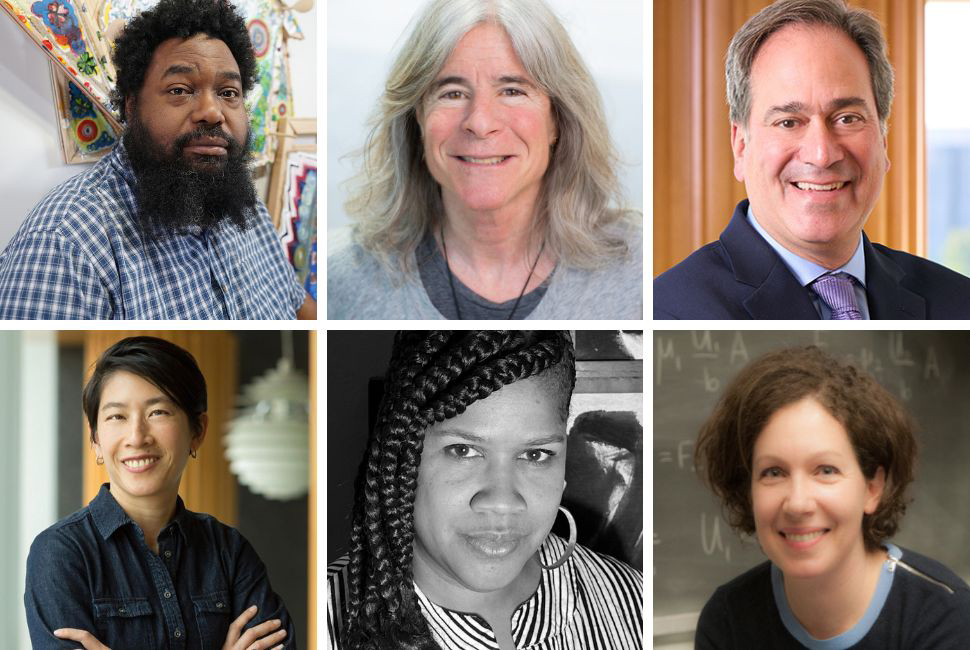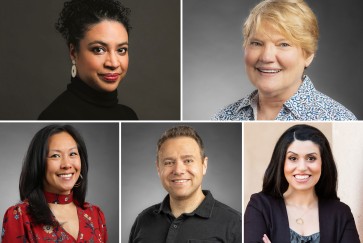Six Northwestern faculty are among the 2024 Guggenheim Fellows recently named by the John Simon Guggenheim Memorial Foundation. The faculty members are Mike Cloud, Nina Kraus, Chad Mirkin, Teri Odom, Krista Thompson and Petia Vlahovska.
This year, the foundation awarded 188 Guggenheim Fellowships to a diverse group of culture-creators working across 52 disciplines. Chosen through a rigorous application and peer review process from a pool of almost 3,000 applicants, the Class of 2024 Guggenheim Fellows was tapped on the basis of prior career achievement and exceptional promise. As established in 1925 by founder U.S. Senator Simon Guggenheim, each fellow receives a monetary stipend to pursue independent work at the highest level under “the freest possible conditions.”
Since its establishment, the foundation has awarded more than $400 million in fellowships to more than 19,000 fellows.
“Humanity faces some profound existential challenges,” said Edward Hirsch, award-winning poet and president of the John Simon Guggenheim Memorial Foundation. “The Guggenheim Fellowship is a life-changing recognition. It’s a celebrated investment into the lives and careers of distinguished artists, scholars, scientists, writers and other cultural visionaries who are meeting these challenges head-on and generating new possibilities and pathways across the broader culture as they do so.”
Mike Cloud
Mike Cloud is a painter and an associate professor of art, theory and practice in the Weinberg College of Arts and Sciences.
His artistic practice encompasses an expanded field of painting and image-making. He dissects photographic and painterly form, scrambling text and re-aligning content in a way that produces new breaks in legibility and new understandings.
A focus of his work is to examine paintings as objects within a system of objects. He uses marks, symbols, motifs, palettes and forms in an expressive technique that blurs and blends elements together into aesthetic compositions, while also interrogating the politics, contrivances and language of painting to locate his complicity in its system of functions.
His solo exhibitions include “Called Ahead” (2024) at Fahrenheit Madrid, Spain; “Tears in Abstraction” (2019) and “Bad Faith and Universal Technique” (2014) at Thomas Erben Gallery, New York; “The Myth of Education” (2018) at the Logan Center for the Arts in Chicago; and “Special Projects: Mike Cloud” (2005), MoMA PS1, New York.
He will use his Guggenheim Fellowship to develop “Holistic Abstraction,” a new body of research, writing and paintings inspired by ancient, classical and religious diagrams of the universe that present modes of abstraction that take a holistic view of artistic ambition.
Nina Kraus
Nina Kraus is a professor of neurobiology and otolaryngology and holds the Hugh Knowles Chair of communication sciences and disorders in the School of Communication and is the director of the Auditory Neuroscience Lab “Brainvolts” at Northwestern.
A scientist, inventor and amateur musician, her research is focused on the biology of auditory learning. She was among the first to discover that individual neurons change their firing patterns when sound-to meaning connections are made. Through auditory neuroscience, Kraus shows how our lives in sound impact our neurological health, changing the brain and affecting our interactions with others.
An author of over 400 scientific publications, she also seeks to engage a broader audience through public lectures and writing. She is the author of the book “Of Sound Mind: How Our Brain Constructs a Meaningful Sonic World” (MIT Press, 2022). Pursuing connections across disciplines in science and the humanities, Kraus’ research is conducted beyond the laboratory and inside schools, community centers, athletic facilities and clinics to advocate for best practices in education, health and social policy.
Kraus will use her Guggenheim Fellowship to write a book that asks what music can teach us about our biology.
Chad Mirkin
Chad A. Mirkin is the director of the International Institute for Nanotechnology and the George B. Rathmann Professor of Chemistry, Chemical and Biological Engineering, Biomedical Engineering, Materials Science and Engineering, and Medicine at Northwestern. He is a chemist and a world-renowned nanoscience expert, who is known for his discovery and development of spherical nucleic acids (SNAs) and SNA-based biodetection and therapeutic schemes, dip-pen nanolithography (and related cantilever-free nanopatterning and materials discovery methodologies), on-wire lithography and co-axial lithography and high-area rapid printing and contributions to supramolecular chemistry and nanoparticle synthesis.
He has authored over 870 manuscripts and over 1,200 patent applications worldwide (over 430 issued) and founded multiple companies. Mirkin has been recognized with over 250 national and international awards and served for eight years on the President’s Council of Advisors on Science and Technology and is one of a few scientists to be elected to all three U.S. National Academies and the American Academy of Arts and Sciences.
Mirkin will use the award to pursue groundbreaking research that will use nanotechnology to transform how vaccines are developed for treating deadly forms of cancer.
Teri W. Odom
Teri W. Odom is the Joan Husting Madden and William H. Madden, Jr. Professor of Chemistry and the chair of the department of chemistry in Weinberg College. She also is a member of the International Institute for Nanotechnology and Chemistry of Life Processes Institute.
A member of the National Academy of Sciences and the American Academy of Arts and Sciences, Odom is an expert in designing structured nanoscale materials with exceptional optical and physical properties. By controlling materials architectures over multiple length scales, Odom’s research group can transform ordinary materials into extraordinary ones. For example, her team has demonstrated that precious metals can be made even more precious by tuning their size and shape at the nanoscale.
Among her many achievements, Odom has pioneered a suite of multi-scale nanofabrication tools, which have resulted in flat optics capable of manipulating light at the nanoscale and beating the diffraction limit, plasmon-based nanoscale lasers that exhibit tunable color, and hierarchical substrates that show controlled wetting and super-hydrophobicity.
Odom will use her Guggenheim Fellowship in chemistry to design and develop structured color materials that can be used as nanoscale coatings for cooling surfaces, such as those on city buildings.
Krista Thompson
Krista Thompson is an art historian, curator and the Mary Jane Crowe Professor in Art History and director of graduate studies in art history in Weinberg, where she is a faculty affiliate in the department of Black studies. Thompson also is a faculty affiliate in the department of performance studies in the School of Communication.
Thompson’s research focuses on modern and contemporary art and visual culture of the African diaspora and Caribbean, with an emphasis on photography, photographic archives and lens-based practices. She is the author of “An Eye for the Tropics” (Duke University Press, 2006) and “Shine: The Visual Economy of Light in African Diasporic Aesthetic Practice” (Duke University Press, 2015). Thompson is the co-editor (with Claire Tancons) of “En Mas’: Carnival and Performance Art of the Caribbean” (2015) and co-editor (with Huey Copeland) of a series of articles on afrotropes published by Art Journal.
She will use her Guggenheim Fellowship to complete a book on Tom Lloyd, an African American artist who was among a wave of artists working with light and electronic technologies in the 1960s.
Petia Vlahovska
Petia Vlahovska is a professor of engineering sciences and applied mathematics in the McCormick School of Engineering, where she directs the Complex Fluids and Soft Interfaces Lab.
An expert in fluid dynamics and soft matter, Vlahovska integrates theory and experiments in mathematical modeling of physical and biological systems leading to cutting-edge work on blood flow, biomembrane mechanics, electrohydrodynamics and active matter. In her studies of active fluids, Vlahovska was the first to examine the collective dynamics of “microrotors,” or dense suspensions of self-propelled, tiny rotating spheres.
Vlahovska also is interested in the membranes that encapsulate cells and play a central role in all living systems. Her work examines membranes’ non-equilibrium behavior, an emerging topic at the forefront of biophysics research.
The Guggenheim Fellowship will support Vlahovska’s efforts to harness active fluids for the engineering of micro-robotic systems mimicking the autonomous motility and responsivity of biological cells.


